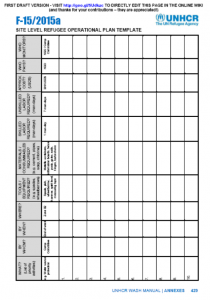
This document describes the objectives and underlying principles of WASH programming in the UNHCR Comprehensive Refugee Response Framework, including steps to be taken, and the role of UNHCR. Guidance is provided for all phases of the relief cycle from preparedness to long-term inclusion.

The Cost of Water Project supports the effective planning and sustainable management of water supply systems in refugee camps and settlements. Launched in 2014 by the Water, Sanitation and Hygiene (WASH) Unit in DPSM’s Public Health Section in partnership with the International Water and Sanitation Centre, the project measures the overall costs of providing effective water systems in a variety of refugee hosting contexts to create a flexible decision-making tool specific to refugee situations.
Organisations: Aguaconsult.

Where required, UNHCR and WASH actors should work together to develop a country level refugee WASH strategy document that clearly describes the refugee context and the baseline WASH situation, along with short, medium and long-term strategies for each of the WASH sub-sectors. This template can be used to help produce a short and concise Country level WASH Strategy. It includes a phased approach, HR requirements and site-level Operational Plans.

A practical guidebook on increasing nutritional impact through integration of WASH and Nutrition programmes. It is meant for practitioners in humanitarian and development contexts.

The UNHCR WASH Manual: Programme Guidance, provides practical guidance for WASH programmes in refugee settings.

This report is based on a desk-based review of secondary data, comprising published material as well as grey literature, supplemented with key informant interviews for programmes that lacked documentation. Section One summarises the current use of CBI in WASH programming. Section Two summarises the best practices and lessons learned including challenges faced, drawing on evidence from the project examples found. Section Three provides recommendations and best practice guidance for use of CBI in refugee settings. Section Four details existing tools and guidance.

This template can be used to help UNHCR and WASH actors establish a simple WASH operational plan (WHO will do WHAT, WHERE, WHEN, and HOW and WHO will PAY and WHO will MONITOR). This template can be used in addition to the site level WASH Strategy Template.

This document describes UNHCR’s global strategy for public health through a set of guiding principles and strategic approaches including protection; age, gender and diversity; equity; access; sustainability; community empowerment; appropriateness and reliability; partnerships and coordination; capacity building; communication and advocacy; integrated approaches; measurement and monitoring; and innovation. The document describes strategic objectives and enabling actions per sub-sector (Public Health, HIV and Reproductive Health, Food Security and Nutrition, and WASH).
Tags: Capacity Building, Capacity Building, Capacity Building, Capacity Building, Gender, Gender, Gender Based Violence, Gender Based Violence, Human Right to Water / Sanitation, Human Right to Water / Sanitation, Human Right to Water / Sanitation, Human Right to Water / Sanitation, Protection, Protection, Protection, Protection, Public Health, WASH Coordination, WASH Coordination, WASH Coordination, WASH Coordination, and WASH Coordination. Categories: WASH Guidelines, WASH Guidelines, WASH Operational Guidelines, WASH Operational Guidelines, WASH Operational Guidelines, WASH Operational Guidelines, WASH Operational Guidelines, WASH Policy Guidelines, WASH Policy Guidelines, WASH Policy Guidelines, WASH Policy Guidelines, WASH Policy Guidelines, and WASH Policy Guidelines.

A summary of UNHCR water, excreta management, solid waste management, disease vector control and hygiene promotion standards and indicators for emergency and post emergency refugee settings including means of verification.
Tags: Bathing Facilities, Disease Vector Control, Disease Vector Control, Drainage, Excreta Management, Excreta Management, Excreta Management, Handwashing with Soap, Hygiene Promotion, Hygiene Promotion, Hygiene Promotion, Solid Waste Management, WASH Assessments, WASH Assessments, WASH Assessments, WASH Assessments, WASH Monitoring, WASH Monitoring, WASH Monitoring, WASH Monitoring, WASH Monitoring, Water Quality Testing and Surveillance, Water Supply, Water Supply, and Water Supply. Categories: WASH Indicators and Standards.

This report applies the life-cycle costs approach (LCCA) to the provision of water services in two UN refugee camps, Bambasi in Ethiopia and Kounoungou in Chad. It is based on cost data from financial reports in Geneva and both camps and on service-level data collected through the UNHCR monitoring system and on site through water point surveys.
The purpose of the study was (1) to better understand the structure, magnitude and drivers of the cost of providing a targeted level of water service to refugees, and (2) to reflect on the applicability of LCCA in the UNHCR monitoring framework and the potential for implementing it in systematically.
Tags: Value for Money, Value for Money, Value for Money, and Value for Money. Locations: Africa, Africa, Bambasi, Chad, East and Horn of Africa, Ethiopia, Kounoungou, and Sudan and Chad Special Operational Region. Languages: English, English, English, English, English, English, English, English, English, and English. Organisations: IRC (International Water and Sanitation Centre), IRC (International Water and Sanitation Centre), UNHCR, UNHCR, UNHCR, UNHCR, UNHCR, UNHCR, UNHCR, UNHCR, and UNHCR. Categories: WASH Reference Documents, WASH Reference Documents, WASH Reference Documents, WASH Reference Documents, WASH Reference Documents, WASH Reference Documents, WASH Reference Documents, WASH Research Documents, and WASH Research Documents.










